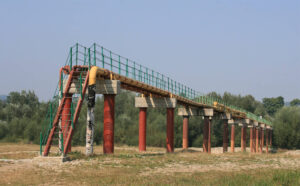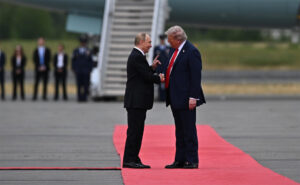Thursday, March 22 was a big day, but before I get into the meat, there’s a couple of items I need to do a quick update/refresh on.
On March 1st the Trump administration announced tariffs on imported aluminum and steel. In the three weeks since the Americans have granted temporary waivers for a majority of the countries that send America the two metals, most notably Canada, Mexico, and the European Union. In the case of Canada and Mexico, it was so that the tariffs could be used as a cudgel in ongoing NAFTA renegotiation talks – something that has annoyed the Canadians and Mexicans more than a bit.
The European case is a touch more involved. Within hours of Trump announcing the initial tariffs, the European Commission – that’s the EU’s administrative/executive arm – announced a wide-ranging series of counter tariffs targeting firms headquartered in the districts of the entire Congressional leadership. I got a good laugh out of this. Not only did the Commission clearly have that list drawn up well in advance, it also highlighted just how ignorant they were of U.S. politics. Foreigners punishing Nancy Pelosi’s or Mitch McConnel’s districts for something that Trump did isn’t going to earn those foreigners any favors. If anything it might have encouraged the Americans to close ranks a bit.
(What Brussels was likely aiming for here was to copy the tried-and-true American strategy of selectively targeting countries in Europe that are causing problems in trade negotiations, for example putting tariffs on French cheese when France is causing issues in agricultural trade talks. That works well. But going after folks in unrelated industries who are not responsible for trade policy just tends to piss people off.)
All in all it was a traditional bureaucratic kneejerk reaction that can only come from a keyhole view of the situation, and Trump very quickly shattered the myth of European options by tweeting out that should those counter-tariffs come into play, he would simply bar the import of European automobiles into the American market. This would hit the Europeans on two fronts. First, the Americans are at least nominally still Europe’s security guarantor and any real trade war between the two would erase any pretense of alliance at a time when Turkey has become unhinged from NATO and the Russians are on the march (security issues are not a remit of the European Commission so such never entered into their calculus). Second, fully half the German economy is trade-dependent, and some 80% of the vehicles Germany manufactures are sent abroad. Any meaningful trade war would quickly wreck Europe’s core.
One can imagine the Prussian fury that surely flowed across Europe’s phone circuits when German Chancellor Angela Merkel called up the eurocrats to tell them what they were going to do. Those eurocrats have since cooled their jets and sought talks with the Americans on how to get a waiver for the aluminum and steel sanctions. Those talks were completed last week, and the Europeans made a very interesting concession. The EU only received its (temporary) waiver on the condition that they enter into talks with the Americans on presenting a joint position on aluminum and steel versus the Chinese.
China’s steel industry is the most overbuilt and oversubsidized sector in a country that is massively overbuilt and oversubsidized. It alone is now the source of the majority of the world’s excess steel capacity and global steel exports. A TransAtlantic gang-up makes a lot of sense.
Now back to March 22.
On that day President Trump announced tariffs on a mix of $50 billion to $60 billion of Chinese exports to the United States in retaliation for a product dumping, lack of reciprocity on market access, and intellectual property theft. The whiff of a trade war between the world’s two largest economies is in the air, and the American media is apoplectic… as it tends to be whenever it discovers the president did not die in his sleep. This time more serious commentators (i.e. the stock markets) also registered their concerns with most indexes selling off sharply.
The issue is this isn’t about “merely” $60 billion in goods. The Chinese development model is based on overbuilding, subsidization, product dumping, lack of reciprocity and intellectual property theft. Any serious effort by the Americans to pare any of that back cuts to the core of Chinese economic growth, employment, Communist Party dominance and the very political stability of the entire Chinese system.
But the Chinese have little leverage here. Let’s go down the list.
- China is a massive exporter to the American market, but the converse is not true. In any trade conflict the Chinese get hosed economically.
- The Americans maintaining of the global trade order is what enables the Chinese to export to everyone else. Just as the Germans fully realize that a fight with the US on trade is one in which they have no hope, so too do the Chinese (at least at the top, at least in private).
- Even without the trade order, the U.S. Navy controls the oceans to an overwhelming degree. Even with recent expansions the Chinese navy is no more than 3% as powerful as the American Navy on a global basis. If a bilateral trade war were to evolve into something more shooty, the Chinese would lose nearly allexports and all imports – including some three-quarters of their oil needs.
- North Korea is no longer a card the Chinese can play. Pyongyang’s recklessness with its nuclear and missile program has now attracted the full attention of President Trump – a man not known for his subtlety. There are only three ways forward for North Korea at this point. The United States nukes it which eliminates China’s only “ally”. The United States rings it with missile defenses which negates China’s own strategic deterrent. Or the United States cuts a deal that both Washington and Pyongyang can live with. Option 3 is by far China’s preferred option and Beijing is (quietly) facilitating a pending summit between Trump and North Korean leader Kim Jong Un.
- The T-bill bomb that many have suggested is China’s supposed ace is utter rubbish. The logic is that in a real spat the Chinese, the second-largest foreign holder of U.S. government debt, could just dump some of the U.S. T-bills it holds on the market and crash the U.S. economy. That’s not how things work.
- You cannot just walk up to the U.S. Treasury building and demand your money back; it’s a fixed term note.
- Any interim sale of a T-bill to another party has to have a buyer. No buyer, no sale.
- China could theoretically try and sell its T-bills whenever the U.S. Treasury was trying to sell new debt and that would raise the cost of U.S. financing. But not only is the U.S. T-bill market the largest in the world so it would have to be a big sale, but what would “massive” success bring? It would push down the value of the U.S. dollar. Considering the Chinese regularly intervene in their markets to push the U.S. dollar up so that they can sell more goods into the U.S. market, it would work at cross purposes to the set of Chinese policies that make the Chinese economy possible.
- And of course, the U.S. Federal Reserve can simply mop up the T-bill market if it chooses by printing currency. It’s a perk of running the global currency.
It isn’t that the Chinese cannot hurt the Americans on trade, just that they can’t without also causing themselves catastrophic damage. It is an America-sneezes-China-gets-
Which brings us to the other news of the week. Enter John Bolton.
On March 22 U.S. President Donald Trump fired his national security advisor, General HR McMaster, a man whom many in the national security establishment have profound respect for, and replaced him with John Bolton, a man whom very few hold any respect for.
Many people might rightfully despise Bolton and all that he stands for. Critics say he has never met a country he didn’t want to bomb, a government he hasn’t wanted to overthrow, and an ally he didn’t want to intimidate. And when you look at his public statements on Iran, Iraq, Saudi Arabia, Turkey, France, Germany, the United Kingdom, Russia, China, Japan and the Koreas it is pretty easy to come to the conclusion that the dude holds some fairly strong and mean-spirited opinions. I tend to lean toward the majority view on Mr. Bolton when it comes to his policy preferences. That, and he’s a prick.
But no matter how unlikable he may be, what you can not say about Bolton is that he’s incompetent or inexperienced. If you can put politics and personality aside for a moment, Bolton is one of the most skilled diplomats the United States has ever had. He was a protégé of James Baker, arguably the best Secretary of State in modern times. He knows the ins and outs of how diplomacy – both hard scrabble and polite – works and just where to dot i’s or twist arms, send flowers or send ammunition. His most infamous innovation is that he fully embraces military options as part of the “diplomatic” toolkit, something that many diplomats are too meek or polite to say publicly, but he also excels at building ad hoc international coalitions on the fly to change international law as he did to rein in North Korean missile proliferation in the 2000s. He certainly breaks the mold that claims that diplomats have to be diplomatic.
The worldview of Donald Trump is far closer to Bolton’s heart than any other president, and it is obvious to everyone with a pulse that what Trump has been missing is someone who can translate TrumpTantrums (TM) into actual policy. For those (like me) who are frustrated with the lack of consistency in Trump’s actions, this could be a positive sign. For those terrified (like me) of all the implications of some of Trump’s positions, this could be horrible.
I don’t want to overplay this. The position of the National Security Advisor has exactly as much power as the president chooses to delegate. Some – like Condoleezza Rice and Henry Kissinger – had massive reach, while others – Susan Rice comes to mind – were barely in charge of their own stationery. But whether Bolton is large and in charge or simply tickles the part of Trump’s psyche that loves disorder while holding the door open so the bull can ravage the China shop, John Bolton may be just what Trump needs to translate his foreign policy goals into hard reality.
And the Chinese know it.
Consider the timing of events last Thursday. First, Trump announces his tariffs on China. Second, Chinese media explodes with vitriol and threats of retaliation. Third, the Europeans cut their deal with Trump to avoid the aluminum and steel tariffs should they join Trump’s efforts against China. Fourth, it is confirmed that Bolton will replace McMaster as Trump’s new National Security Advisor. Fifth, the Chinese government forces Chinese financial houses to massively intervene in Chinese stock markets to prevent a rout of epic proportions.
Beijing knows exactly what’s going on here.
If this is real, if Trump means to break the Chinese position (and maybe even the Chinese system’s back), then Bolton is a solid choice and tariffs are a good knife and Bolton will repeatedly use that knife in ways too effective and cruel for me to opine about at present.
Finally, a parting thought:
Trump is not a freshman president anymore. Might he be finding his feet? He seems to be linking issues and personnel and approaches together into a kind-sorta unified theme. If I didn’t know better, I’d say that Trump just might be in the process of getting a handle on this foreign policy thing.









